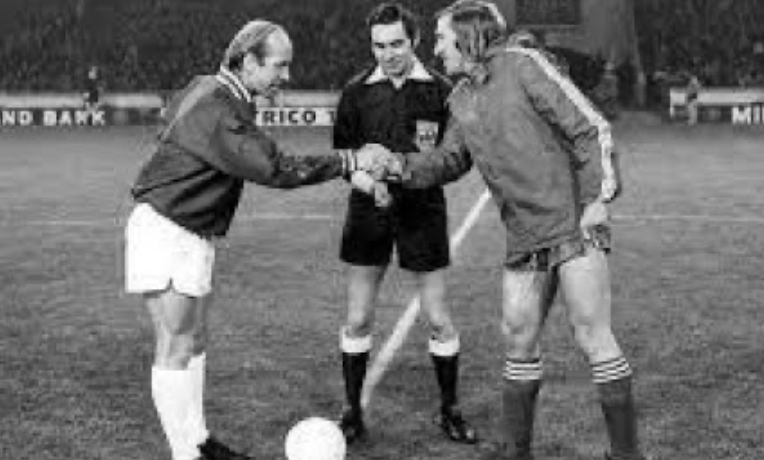By David Owen
January 3 – Today marks the 50th anniversary of a very odd football match at Wembley Stadium.
Reported at the time as the Three versus the Six, it actually pitted a team of international players from England, Scotland, Northern Ireland, the Republic of Ireland and Denmark against a side from France, Belgium, West Germany, Italy and the Netherlands; ie, the Five versus the Five, or so you might say.
In spite of the foggy start to the year in the London region, and the lack of silverware – or anything much else – hanging on the outcome, the roll-call of stars was sufficient to draw a crowd of 36,500 to the world-famous venue.
With three of England’s World Cup-winners from 1966 taking on a whole bunch of those who would contest the following year’s West Germany v Holland World Cup final, you might argue that this was the very least the confrontation demanded.
Nevertheless, in an era when even the top club sides still mainly consisted of players of the same nationality as the club, such multinational line-ups were a real curiosity.
What can have explained such a novel division of forces? In a word: politics. January 1, 1973 marked a momentous day for Great Britain, the Republic of Ireland and Denmark – ‘the Three’ in terms of the nomenclature of this one-off match. It brought their accession into the European Economic Community (EEC), the European Union (EU), as it eventually became.
The game – pitting a squad of players from these three new member-states against a squad from the six existing members (albeit little Luxemburg went unrepresented) – was part of a days-long celebration of this historic step.
In Great Britain, then led by Ted Heath, the music-loving Conservative Prime Minister, this succession of events was bracketed under the general heading of the ‘Fanfare for Europe’. Events included a concert by the Danish Radio Symphony Orchestra at Coventry Cathedral; a London-to-Brussels veteran/vintage car rally (started by Heath from Horse Guards Parade); a banquet at Hampton Court; and exhibitions such as Treasures from the European Community at the Victoria & Albert Museum and The Impressionists at the Hayward Gallery.
The football match actually took place on the same evening as a gala performance at the Royal Opera House. So it was to Covent Garden that the Prime Minister and Her Majesty the Queen made their way. The Queen and the Duke of Edinburgh took the train, hopping aboard the 13.27 to London from Lynn in Norfolk. On arrival for the concert, the Daily Mirror reported that the VIPs were welcomed by a guard of honour comprising “soldiers from the Common Market countries”, but also a turn-out of anti-Common Market demonstrators.
Down Wembley way, to judge by a French-language video of the second half, all was very easy on the eye, but there was a definite lack of edge – typical ‘friendly’ fixture fare, really.
One thing that everybody present seemed to enjoy was the sight of 35-year-old Bobby Charlton patrolling the Wembley turf – on which he had won both the World Cup and the European Cup – one more time. The veteran did not quite manage a goal, but early in the second half, it was his pinpoint left-footed cross that set up the Dane Henning Jensen to open the scoring for the Three by nodding past Italy’s Dino Zoff.
Later, Scotland and Coventry City’s Colin Stein added a second, and that was how it finished.
The Six, playing all in red against the Three’s all-white, pieced together the more flowing moves, marshalled by the long-striding, long-haired West German midfielder Günter Netzer. But, in spite of a line-up also featuring the brilliant Gerd Müller, Dutch midfielder Johan Neeskens and Jürgen Grabowski, the German winger who had tormented England in Mexico in 1970, they were unable to beat the great Pat Jennings of Northern Ireland, who had an excellent game in goal for the Three. The closest the Six came was a Netzer free-kick that struck a post.
Classy performances for the Three were also given by Johnny Giles, the Republic of Ireland playmaker, and the inimitable Bobby Moore at the heart of the defence.
As it turned out, not even the beautiful game could sell the British people on the EEC. For this it took Britain to vote to leave the EU in a referendum 43 years later; this has of course resulted in the EU becoming arguably more popular in our island kingdom today than it has ever been.
Contact the writer of this story at moc.l1736452507labto1736452507ofdlr1736452507owedi1736452507sni@n1736452507ewo.d1736452507ivad1736452507

